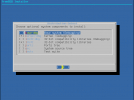Hello! I'm relatively new to Linux and definitely green with BSD. I'm attempting to install and having an issue with obtaining files.
First, my confusion is with the missing files themselves, as I'm not doing a network installation and am using the .img file from USB. I used Win32DiskImagerto create the boot loader there. I also confirmed the hash with chksum. Given this, why would I be missing files?
Aside from that, though, my main problem seems to be that I can't use my NIC during the install. ifconfig only gives me a status on the loopback, so there's that, but I've also tried to bring the NIC up with dhclient and am not having any luck there. But, given that I can't see the NIC, I suppose that doesn't surprise me.
My stopping point during the install happens after creating partitions and committing those changes. The install process then allows me to select a site to download the missing files from, but of course this is where it ends since there's no connection.
Thanks in advance for any help! I've searched here in the forums and elsewhere in general, but am not finding much outside of what I've already tried.
First, my confusion is with the missing files themselves, as I'm not doing a network installation and am using the .img file from USB. I used Win32DiskImagerto create the boot loader there. I also confirmed the hash with chksum. Given this, why would I be missing files?
Aside from that, though, my main problem seems to be that I can't use my NIC during the install. ifconfig only gives me a status on the loopback, so there's that, but I've also tried to bring the NIC up with dhclient and am not having any luck there. But, given that I can't see the NIC, I suppose that doesn't surprise me.
My stopping point during the install happens after creating partitions and committing those changes. The install process then allows me to select a site to download the missing files from, but of course this is where it ends since there's no connection.
Thanks in advance for any help! I've searched here in the forums and elsewhere in general, but am not finding much outside of what I've already tried.


